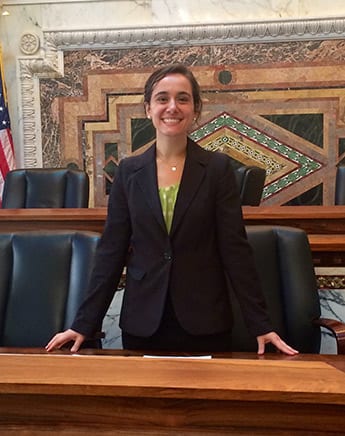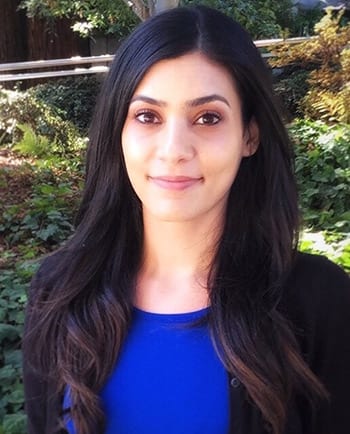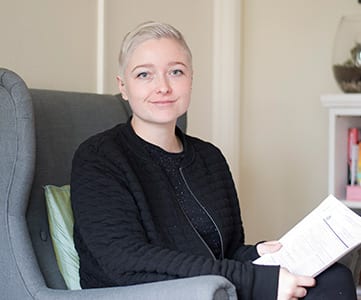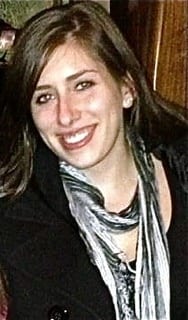By Andrew Cohen

Facing a gauntlet of final exams, December can be a stressful time for law students. It can also be an insular time, as many hunker down to study while ignoring the outside world.
But for the members of Berkeley Law’s student initiative, the East Bay Dreamer’s Clinic (EBDC), uncertainty in that outside world—specifically the fate of the undocumented students they work with—is more concerning than exam results.
During his election campaign, President-elect Donald Trump pledged to remove the approximately 11 million undocumented immigrants living in the United States and to build a wall along the U.S.-Mexico border. He also proposed “extreme vetting” of all Muslims entering the country, and his policy advisors have reportedly discussed plans to establish a registry for Muslim immigrants in the country.
“Our resolve in helping undocumented students is unwavering,” said Sarah Pace ’18, who leads the clinic with classmates Ari Jones ’18, Maram Mahajna ’18, and Faith Shapiro ’18. “EBDC and the other immigration-based clinical organizations are even more motivated now to help undocumented people in this country. The election is going to be a test of our resolve, but we’re ready to keep fighting.”

The dreamer’s clinic conducts programs on campus and at area schools and community centers to assist youth eligible for immigration relief under Deferred Action for Childhood Arrivals (DACA). Created in 2012, DACA provides security against removal and allows undocumented immigrants to receive a two-year work permit subject to renewal, Social Security number, state I.D. card and driver’s license—enabling them to work legally for the first time.
Navigating new terrain
In addition to helping students determine their DACA eligibility, the clinic mobilizes volunteers for information sessions hosted by other organizations and coordinates events focused on immigration issues. Students must complete four hours of training before assisting clients—a process admittedly trickier amid varied reports about how Trump will approach DACA.
“It’s important for us to continue working with our supervising organizations to provide DACA services while the federal program is still available,” Mahajna said. “As many immigrant rights organizations have cautioned against submitting initial applications, we’ll focus on DACA renewals instead.”
DACA has provided a temporary haven and work authorization to more than 700,000 undocumented minors. They are widely referred to as “Dreamers” based on the Development, Relief, and Education for Alien Minors (DREAM) Act, legislation first introduced in 2001. The bill, which has yet to pass, proposes a multi-phase process for granting undocumented immigrants conditional residency and, upon meeting further qualifications, permanent residency.

Jones recently met with a client who is trying to help her grandfather visit the U.S. because he has never met his grandchildren—who are U.S. citizens. Amid the looming uncertainty, the woman broke down in tears.
“She fears being separated from her children and her U.S.-citizen sister,” Jones said. “All I could do was assure her that she has done as much as she can to protect her family. Now she must wait until after the inauguration to see what policy changes actually result.”
A unified campus front
The clinic leaders take solace in the fact that campus leadership and UC President Janet Napolitano—who approved DACA during her time as Secretary of Homeland Security—have stated their intent to protect undocumented students’ privacy and civil rights.
In a recent New York Times op-ed, Napolitano said, “Dreamers, among other requirements, came to the United States as children, developed deep roots in the country and have become valuable contributors to their community. They must be in high school or have a diploma, or be a veteran, and they cannot have been convicted of a felony or major misdemeanor.”

To amplify that message, EBDC has joined forces with the campus-wide Berkeley Immigrants’ Rights Collaborative. Formed by law and public policy students after the election to brainstorm new ways to support immigrants’ rights on campus, the group includes undocumented and former undocumented individuals.
“A unified campus is important in responding to these issues, but even more important is actively listening to and collaborating with undocumented members of the UC community,” Jones said. Her clinic is also in contact with UC Regent and second-year Berkeley Law student Paul Monge ’18 “to advocate for undocumented students across the UC campuses.”
While acknowledging the chaotic climate for immigrants, Shapiro—who advocated for undocumented youth as an undergraduate—has relished the chance to continue that effort at Berkeley Law.
“I learned about the wonderful direct services that EBDC was providing and couldn’t wait to join,” she said. “Hearing each client’s individual story only strengthens my commitment to the work. I believe strongly that all students deserve to learn in an environment in which they feel safe and secure, regardless of their immigration status. I intend to continue providing legal support to this wonderful community in any way I can.”